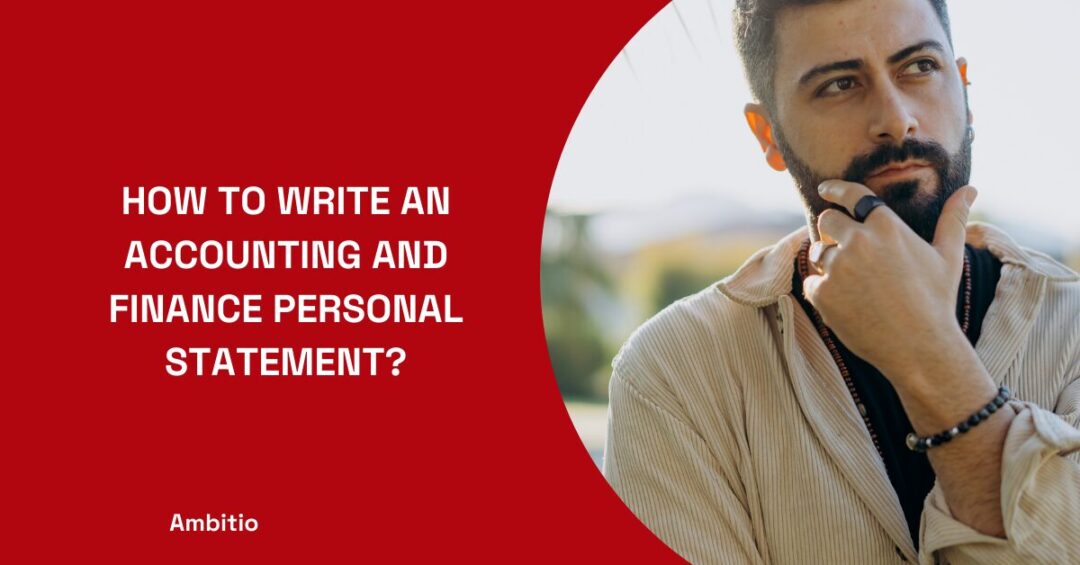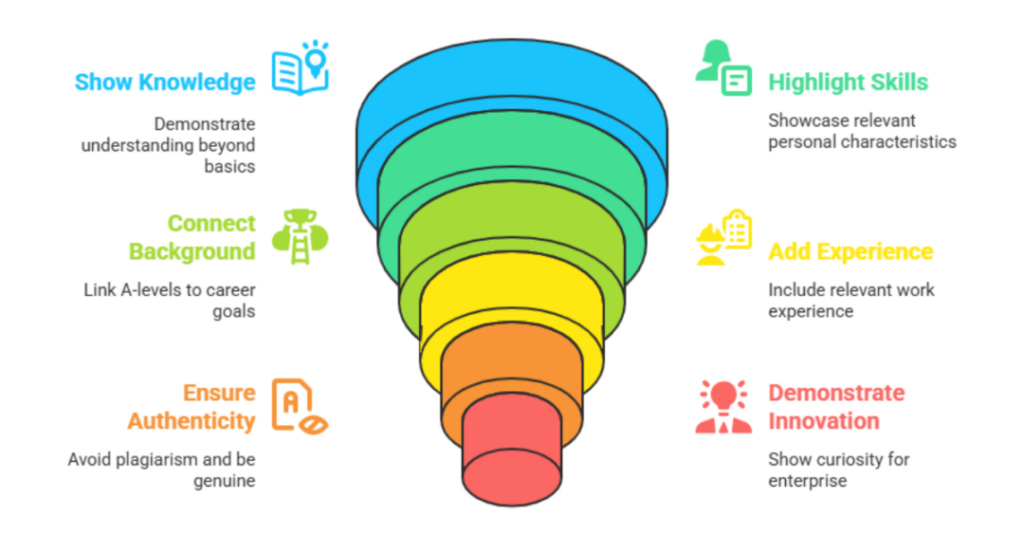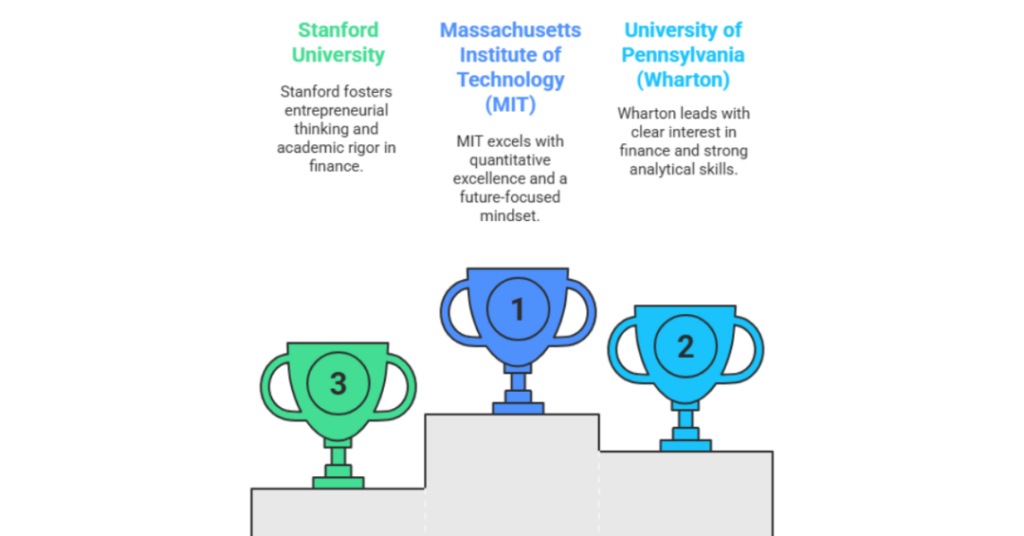18 May 2025
6 minutes read
How To Write An Accounting And Finance Personal Statement?

Key Takeaways
- Write an accounting and finance personal statement that reflects real experiences, not recycled buzzwords.
- Understand that top universities expect proof of critical thinking, not just high grades.
- Focus on practical exposure like shadowing an accountant or Young Enterprise to stand out.
Most accounting and finance personal statements read like a boring maths textbook—dry, robotic, and forgettable. If you’re an applicant hoping to get into uni through UCAS, just saying you “love numbers” or “enjoy economics and mathematics” won’t cut it. You need to show you get what accountancy really means and why you’re more than just another face crunching figures.
The good news? Writing a personal statement that stands out is easier than you think—if you focus on what makes you tick, not just what you’ve memorized.
6 Step To Write A Great Accounting And Finance Personal Statement
In a world where thousands apply to study accounting and finance at university, you have about 4000 characters to prove you’re not just another wannabe accountant who skimmed through A-level math and called it a day. This is your chance to show you understand the business environment, financial market, and that you’ve done more than just read textbooks—you’ve lived it, breathed it, and can connect the dots between theory and practical application.

Here are six game-changing steps that will make your statement a uni guide standout.
1. Show You Know About Accounting and Finance Beyond the Basics
Forget generic phrases—talk specifics. Mention how you explored financial statements or shadowed an accountant to get hands-on experience. Highlight your wider reading, maybe from the LSE or a management school, showing you’re serious about the field of accounting, not just reciting textbook definitions. This tells admissions you understand the real world of finance and aren’t just chasing a degree course for the sake of it.
2. Use Personal Characteristics to Sell Your Passion for the Subject
Universities want more than academic results. Demonstrate your numeracy skills, analytical mindset, and problem-solving ability. Mention practical examples like running a Young Enterprise project or balancing books for a part-time gig. This mix of passion and skills proves you can thrive studying finance and accounting at university—and beyond.
3. Connect Your A-Level Background to Your Future Career Ambitions
Be clear how your A-levels, especially math or economics, laid a foundation for your interest in finance and your future career goals. Show you understand how quantitative skills are crucial for roles in the wider financial market or as an economist. Uni tutors want to see a logical progression, not a scattergun approach.
4. Highlight Work Experience That Adds Depth
It’s not about listing every job; focus on relevant work experience that gave insight into the field of accounting or finance. Shadowing an accountant or part-time roles in financial environments give you practical knowledge that many applicants lack. This experience sharpens your understanding of financial statements and the business environment, which you can then apply during your degree.
5. Make Sure Your Statement Avoids Plagiarism and Stays Authentic
With 4000 characters to play with, originality matters. Avoid cookie-cutter statements or copy-pasting accounting personal statement examples. Personal honesty—about your strengths, challenges, and what you want from studying accounting and finance—resonates more than generic buzzwords. The universities wants the real you, not a recycled essay.
6. Demonstrate Wider Skills and a Curiosity for Enterprise and Innovation
Accounting and finance is evolving fast. Mention your interest in enterprise and innovation, maybe through clubs or personal projects. Show how you’re prepared for the changing business environment and how you intend to apply your skills and knowledge in future roles. It’s about proving you’re not just studying finance at university—you’re ready to lead in the world of finance.
10 Top Undergraduate Universities In The World To Study Finance And Accounting
The global financial management market is expected to reach over $735 billion by 2025, and the average salary of a finance graduate in the U.S. is over $70,000 straight out of university. No surprise then that studying finance and auditing at a top-tier undergraduate university can be a game-changer. But here’s the kicker: elite schools don’t just care about grades—they expect a personal statement that reflects ambition, analytical thinking, and a sharp understanding of the financial world.

So, if you’re eyeing the best financial management programs on the planet, here’s where to look—and what they expect.
| University | Avg. Tuition Fees (USD/Year) | Avg. Starting Salary (USD) | Personal Statement Expectations |
|---|---|---|---|
| University of Pennsylvania (Wharton) | $65,000 | $85,000+ | Clear interest in finance, leadership experience, strong analytical edge. |
| Massachusetts Institute of Technology (MIT) | $60,000 | $90,000+ | Quantitative excellence, problem-solving mindset, future-focused goals. |
| University of California, Berkeley (Haas) | $48,000 (Out-of-state) | $75,000+ | Understanding of global markets, practical finance exposure, initiative. |
| New York University (Stern) | $60,000 | $80,000+ | Demonstrated interest in business environment, creative edge, numeracy. |
| University of Michigan | $55,000 (Out-of-state) | $72,000+ | Real-world application of finance skills, teamwork, curiosity for innovation. |
| University of Chicago (Booth UG) | $62,000 | $80,000+ | Strong math background, economics insight, future financial market goals. |
| Columbia University | $66,000 | $78,000+ | Focused ambition, wide reading, interest in enterprise and finance culture. |
| Stanford University | $63,000 | $85,000+ | Entrepreneurial thinking, passion for the subject, academic rigor. |
| Harvard University | $68,000 | $82,000+ | Big-picture thinking, commitment to social and economic impact, personal growth. |
| University of Southern California (Marshall) | $64,000 | $75,000+ | Exposure to business/finance, collaborative mindset, storytelling clarity. |
Finance And Accounting Personal Statement Example That Always Works
If I had a dollar for every time someone said “I’m passionate about finance,” I’d have enough to launch my own investment firm by now. The truth? Admissions teams don’t want another spreadsheet robot. They want real people—students who get the business world, think critically, solve problems, and actually know what it means to study finance and accounting at university.
So if you’re here looking for a copy-paste miracle, hit back. But if you want a personal statement that actually works—every single time—read on.
Growing up, I thought “accounting and finance degree” just meant high salary. Then I watched my parents struggle to keep their small business afloat—not because they lacked drive, but because they didn’t understand how to manage cash flow or read financial statements. That’s when I realised finance isn’t just about numbers—it’s about making smart decisions that impact real lives. That realisation sparked my interest in accounting and finance as a way to solve real-world problems, not just crunch numbers.
During my A-levels in Mathematics and Economics, I started seeing patterns—how quantitative skills translate into forecasting, risk analysis, and decision-making. I took part in Young Enterprise, where I handled the budgeting and financial planning for our team’s product line. It wasn’t just theory—I saw how every financial move impacted the business. I’ve also been shadowing an accountant part-time, where I’ve learned to interpret financial reports, and more importantly, how to communicate their meaning to non-financial teams. It’s confirmed that this is exactly the field I want to grow in.
I’ve done wider reading around corporate finance and behavioural economics, particularly inspired by LSE articles and case studies. What fascinates me is how finance connects psychology, global trends, and strategy. My goal is to study accounting and finance at university to gain the tools I need to help businesses grow sustainably, make informed decisions, and adapt to a fast-changing financial market.
I’m not applying to tick a box—I’m applying because I’ve already seen the practical application of this field, and I’m hungry to learn more. I know I can bring analytical thinking, real curiosity, and a strong work ethic to your course.
Conclusion
A strong personal statement isn’t about sounding perfect—it’s about being honest, informed, and intentional. If you actually understand what studying finance and accounting means, and you can connect that to your own story, the right uni will notice. Keep it clear, keep it real, and remember—your future in this field doesn’t start after your degree. It starts with how you write this statement.
Most applicants struggle to write a perfect personal statement but end up sounding arrogant — but you won’t. At Ambitio, our AI-powered study abroad experts help you craft a powerful, standout statement that gets noticed. No fluff, no clichés—just a compelling story that proves you belong. Schedule a call with Ambitio’s experts.
FAQs
What is a Master’s in Finance or Accounting abroad?
A Master’s in Finance or Accounting is a postgraduate degree focused on advanced financial theory, quantitative methods, and real-world applications, preparing students for careers in fields like financial analysis, risk management, investment banking, and corporate finance
What are the typical entry requirements?
Most programs require a bachelor’s degree (often in finance, accounting, economics, or a related field), English language proficiency (IELTS/TOEFL), and sometimes GRE/GMAT scores. Some universities may also ask for work experience, but it is not always mandatory
How long do these programs usually last?
Master’s programs in finance or accounting abroad typically last between 10 months and 2 years, depending on the country and university
What is the cost of studying for a master’s in finance or accounting abroad?
Tuition fees vary widely:
USA: USD 50,000–85,000 per year
UK: EUR 30,000–55,000 per year
Australia: AUD 50,000–70,000 per year
Canada: CAD 40,000–75,000 per year
Germany/France: EUR 25,000–50,000 per year
Cost of living is extra and varies by country
Do I need work experience to apply?
Work experience is not always required, but some universities may prefer or require 2–3 years of relevant experience. It can strengthen your application
What are the career prospects after graduation?
Graduates can pursue roles in investment banking, financial analysis, risk management, asset management, consulting, auditing, and corporate finance. Top employers include global banks, consulting firms, and multinational corporations

You can study at top universities worldwide!
Get expert tips and tricks to get into top universities with a free expert session.
Book Your Free 30-Minute Session Now! Book a call now




























